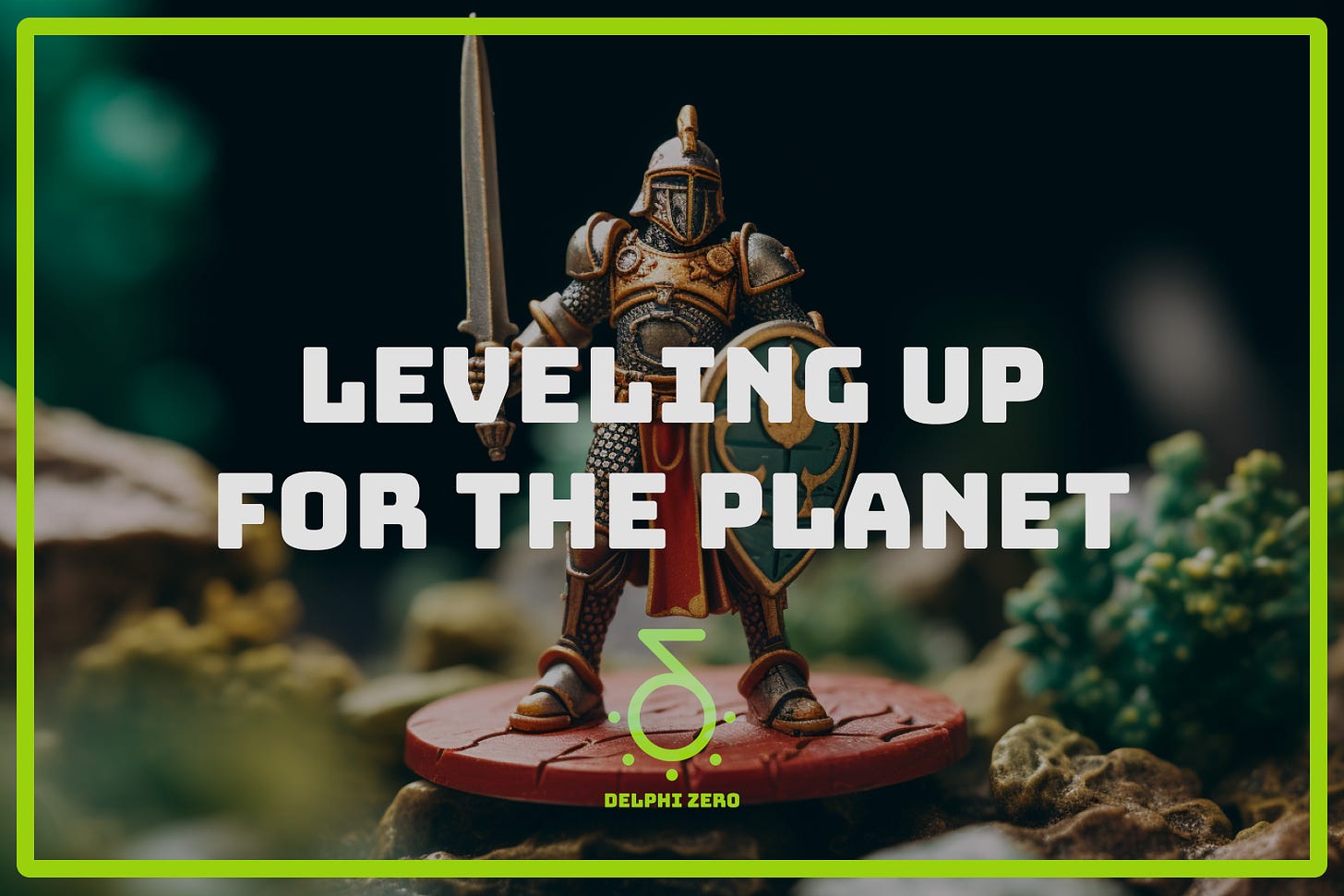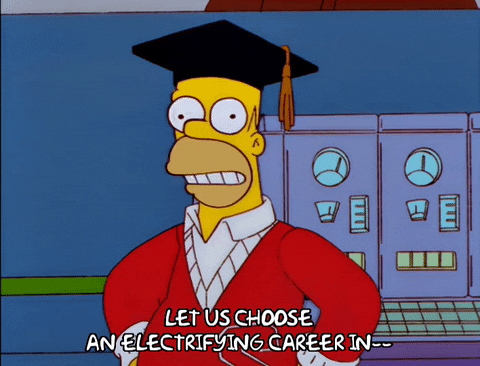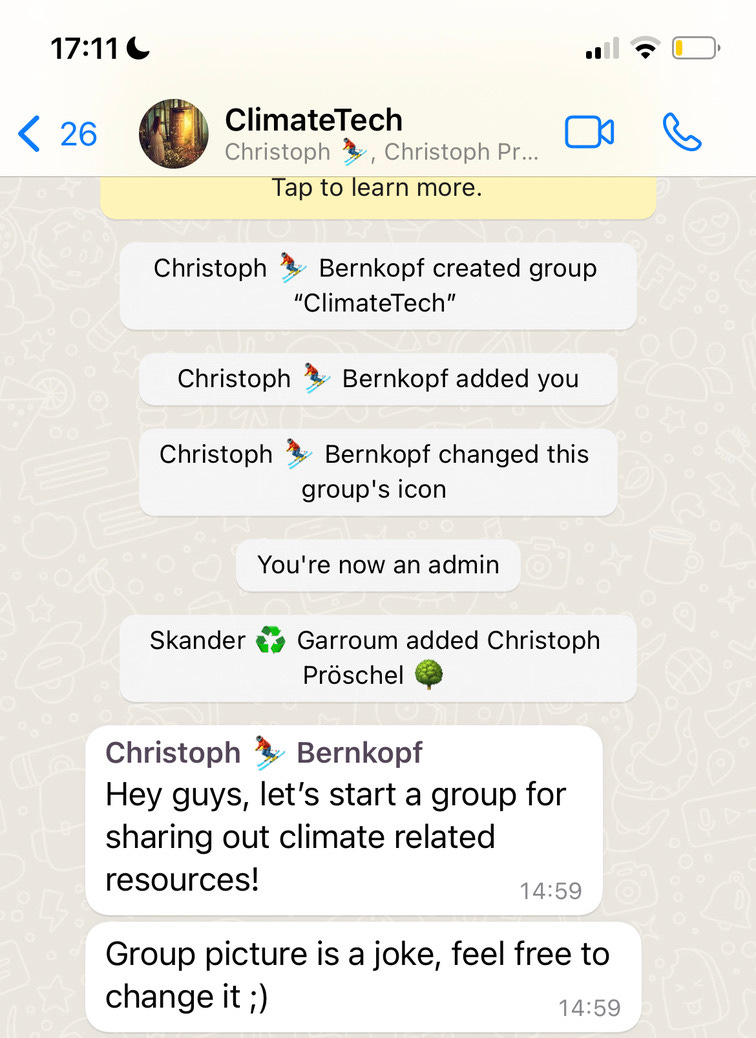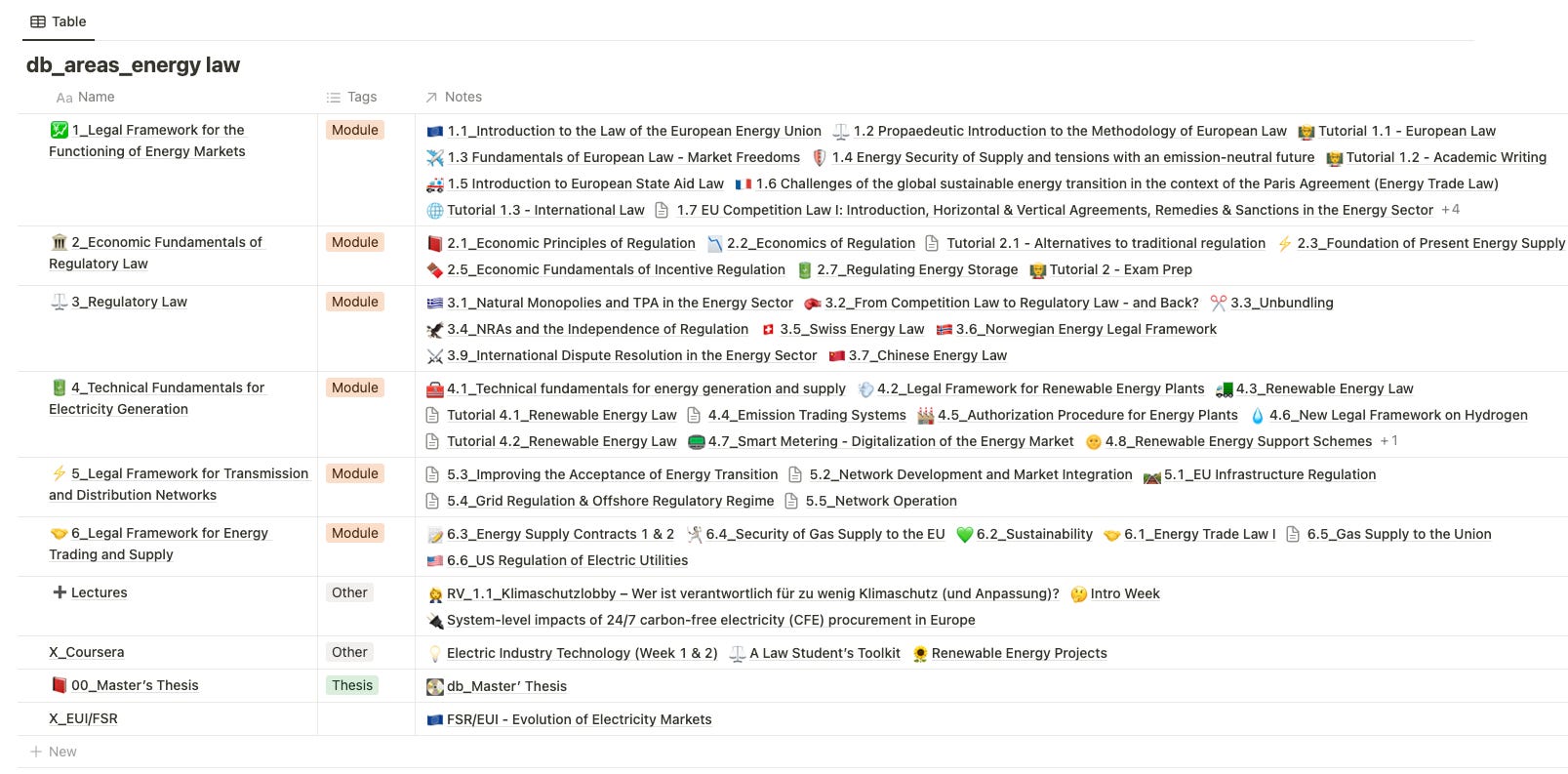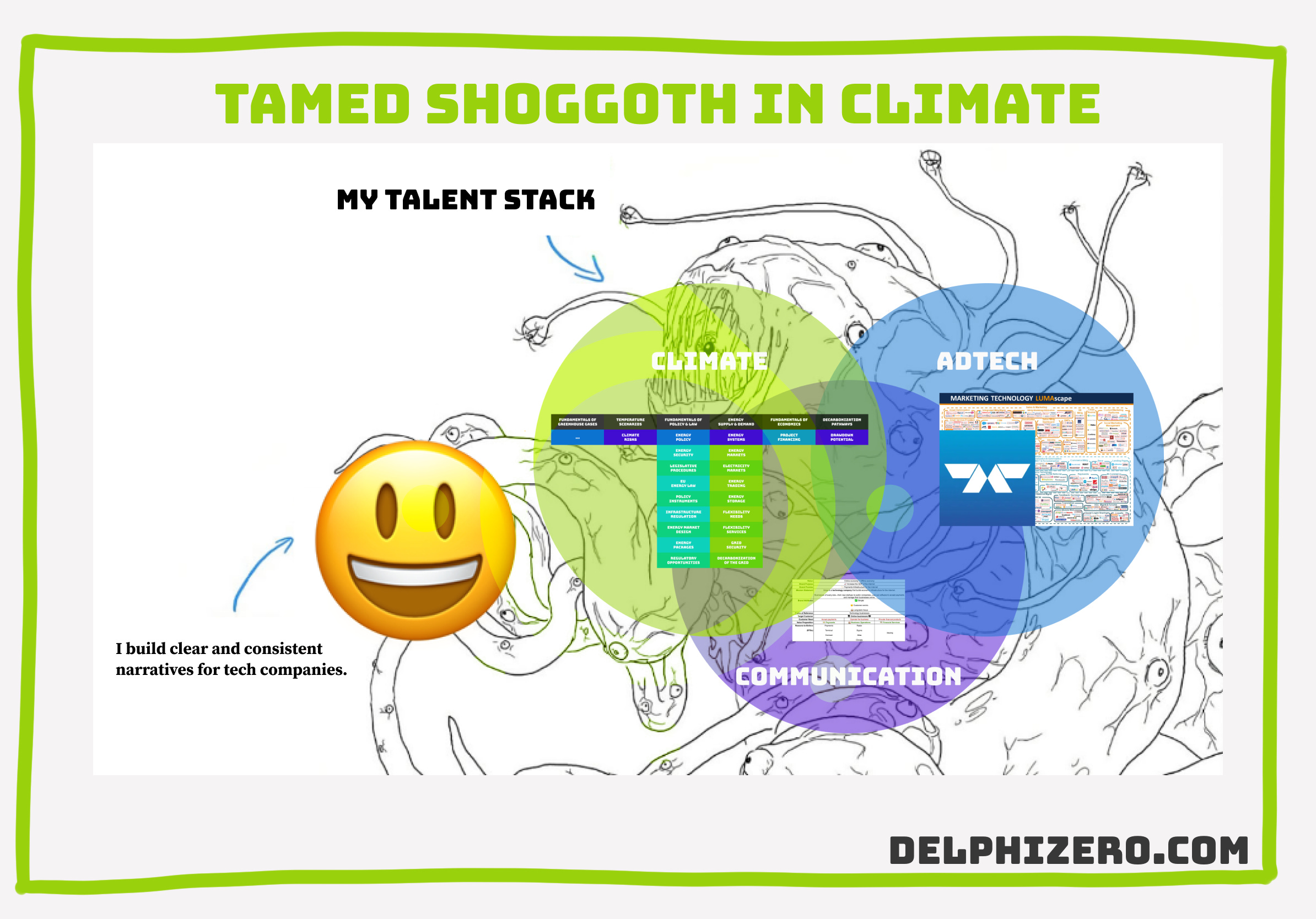👋 Servas to 1,404 climate buddies 🌳
What is this? This newsletter explores topics in climate, energy, and everything in between.
Today we will cover Career Transitions into Climate 🌳
T-Shaped Skills: How to think about skill development for the climate space.
Talent Stack: How to leverage previous experience and build a unique skill set.
Shoggoth Strategy: How to communicate your broad skill clearly.
This will be a fun one. Let’s go 👏
Leveling Up for the Planet
By Art Lapinsch
“I would like to do something about climate but I don’t know where to start.”
I’ve heard this sentence from friends who are done watching from the sidelines and want to get in on the climate action.
This piece provides a detailed look at my journey from business generalist to climate professional. It spans from March 2022 through today and includes key decisions, fun screen shots, and some helpful links.
Hopefully, it helps at least one person to join The Greatest Game of all time - Our Race to Net Zero.
Prologue: The Game of Skills 🎲
What if a career transition into climate could be fun?
“But Art, what are you talking about? Do you mean fun as in painstakingly remembering policy mumbo-jumbo and scientific formulas?”
Nope! The other one.
I’m talking about fun as in leveling up a player character in a game.
Think of this essay as a Climate Skill-Development Manual for Business Generalists.
Skill Trees: Selecting New Pathways
Whenever I’m considering change in my own life, I remember this figure:
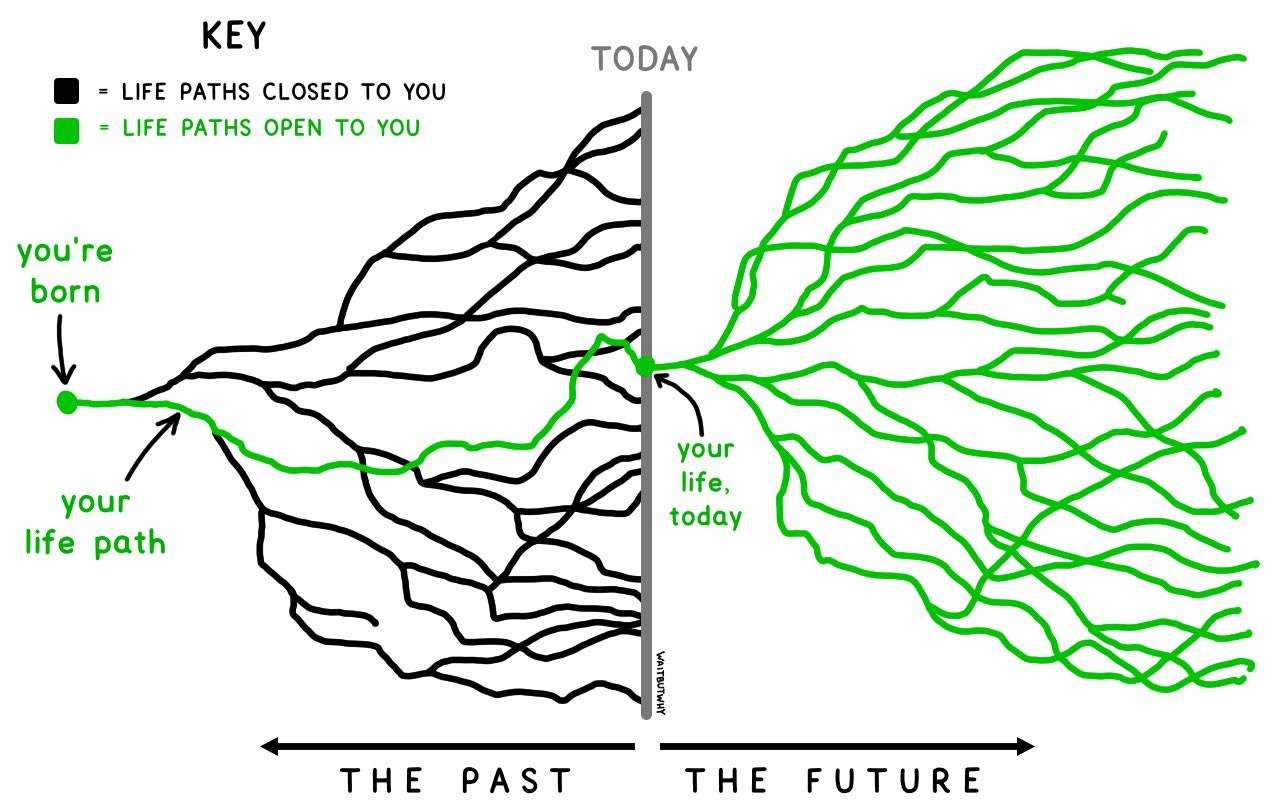
Seeing life as a journey along one of many possible paths is empowering.
I’m in my mid-30s now, and never in a million years could my 18-year-old self predicted where we would end up today. All this goes to show that life is full of potential and it reminds me of a development principle in games: Skill Trees 🌳
Skill Tree: A hierarchical visual representation of customizations a player can make to their character.
Deliberate Choices: The Balance of Skill Acquisition and Tradeoffs
Usually, a player trades limited resources (i.e. experience points; skill points; etc.) for skill development. The same applies in real life. Our limited resource is time. If we want to get better at something, we usually trade our time for the acquisition of a skill.
Relative Strength: Think of Yourself as a Player Character in a Multiplayer Game
Unless your brain is the size of the moon, it’s unlikely that you will get good at everything all at once. One thing that helped me in my own journey was to check myself before spreading my limited resources too thinly.
Role-Player Games (RPGs) usually solve this problem via character classes. In Dungeons and Dragons, barbarians are stronger, druids are more dexterous, and warlocks are more charismatic. Since RPGs are usually played in groups, every character will get their chance to contribute to the team’s epic quest.
Climate is a multi-player game. What team are we on? Team Planet 🌍
So ask: If you were a character, what would be your strongest skill relative to others?
To summarize:
Skill Trees: There are many pathways to explore in the climate space 🗺️
Deliberate Choices: Each decision leaves less time to explore other pathways ⏳
Relative Strength: Skills are evaluated in the context of a multi-player game 🙌
Let me share what I did 👇
Early Steps in my Climate Journey
I have been climate curious since 2020.
I read epic blog posts like Erika Reinhardt’s “Data-Driven Guide to Effective Personal Climate Action” and reached out to OGs in the field, but in the end, I didn’t pull the trigger. This was until February 2022.
Russia’s invasion of Ukraine changed everything for me.
I have family history in that region, many of our Ukrainian friends were affected, and once upon a time my parents and I were war refugees ourselves.
On top, as a German tax payer, it became clearer by the day that security policy and energy policy are heavily intertwined. For better or for worse.
Uncovering a Starting Point
I started doom scrolling and one topic lead to the next: Security updates from the conflict zone → security policy analyses → energy policy analyses → climate technology.
I got hooked by the intersection of Energy 🔋 x Climate 🌳 x Security 🛡️ and my curiosity just ran with it.
Initially, it was just another rabbit hole but soon enough I realized that the climate space was full of opportunity. Finally, I convinced myself to spend the next chapter of my career in climate.
It was time to level up for the planet.
Finding a Journey Group
Hands down, the most helpful thing was to join a journey group.
In my case, I couldn’t think of anyone who was active in the climate space, so I asked a friend.
A couple of intros later, I had my journey group:
Chris B. was researching various problem spaces in climate to start his own business.
Skander was wrapping up his previous founder journey and was looking for what’s next.
Chris P. was completing his Master’s Degree with the intention to enter the climate space.
Two things were particularly helpful:
📚 Knowledge Sharing: A braintrust is better at surfacing relevant information.
🗓️ Accountability: I cannot overstate this point enough. If you promise someone to do something, it creates a very strong incentive for yo’ lazy a$$.
In case you were wondering where my journey group is today:
Chris B. started his climate tech company, raised funding, hired a team, and is deploying the first instance of the product.
Skander started a super popular Substack publication to teach people about the solution landscape in climate.
Chris P. completed his degree and started working as a software engineer in the waste management space.
Eternal gratitude to Andi for those intros and guys for being such a clutch group 🙏
Additionally, I joined MCJ Collective - a slack channel with thousands of professionals on their path into the climate space. The membership costs $100/year. The way I rationalized it is that for <$10/month you would get access to 24/7 climate networking from your phone - a total no brainer if you ask me.
The cosy Whatsapp chat and the MCJ Slack meant that I could interact with people whenever I had a question + the journey didn’t feel so god damn lonely.
Handling Unknown Terrain
Yet, soon after, it hit me like a truck: The climate space is incredibly vast and complex.
My favorite quote is from Nan Ransohoff:
The goal of this step is to learn the ‘minimum amount’ to identify the parts of climate that might be a good match for your interests and skills (and, conversely, which won’t). Because climate touches most of the global economy, the trick is identifying these areas without having to understand everything about everything.
This brings us back to the original question:
“I would like to do something about climate but I don’t know where to start.”
1. T-Shaped Skills: Develop Skills for Climate
In my case, I tried to contain my initial research to the previously identified interests: Energy 🔋 x Climate 🌳 x Security 🛡️

My first goal was to build a mental map of the climate space:
Where are the edges of the map?
Who is participating?
How do the various groups interact?
What are the main flows in this world?
Which fundamental knowledge do I need to learn?
What are common misconceptions?
T-Shaped Skill Set: How to Build Expertise in an Industry
Looking back, it seems that I had - unknowingly - built a T-shaped Skill Set in Climate.
What is a T-Shaped Skill Set? Brian Balfour - the inventor of the term - explained it in his blog post about “How to Become a Customer Acquisition Expert”:
The world of digital marketing is HUGE today. It is easy to get overwhelmed. Having a plan and path is the most important part. I have tried to simplify the path as much as possible. There are three layers:
1. Base Layer
These are non-marketing specific subjects that provide a base to build from. Subjects in the base layer are used throughout the subjects in the next two layers.2. Marketing Foundation
These are marketing subjects you should know that are used across almost any channel you use.3. Channel Expertise
The third layer is where you will need to make some choices. Channels are all the different ways you can reach your audience. It is near impossible to become an expert in all of the online marketing channels AND stay up to date on the latest changes. Each channel is changing unbelievably fast in addition to new channels emerging.That is why I recommend a learning plan that will shape yourself like a “T” [See picture below]. Go broad by knowing the basics including pros/cons of most channels. Then choose to go really deep on a couple channels. Generalists are useless in most work environments. As an expert in certain areas you will be able to build a brand around yourself and stand out from the crowd.
To paraphrase what Brian said for our own use case:
The world of Climate is HUGE today. It is easy to get overwhelmed. Having a plan and path is the most important part.
📐 Base Layer: These are non-area-specific/general subjects in the climate space, which will be used throughout the next two layers.
🌳 Area Foundation: These are climate industry-specific subjects you should know that are used across many fields.
🔬 Area of Expertise: The third layer is where you will need to make some choices. This is where you dive deeper into a particular area in the climate space.
⚠️ Use this structure as a plan/outline for your own skill development.
Here’s an approximate T-Shape of my current skill set in climate:
Information sticks more easily if your brain has previous context for the new info. This idea is called the “Semantic Tree of Knowledge.”
Therefore, it is recommended to build a solid foundation before expanding into specialized knowledge.
I’ll show you which resources/approaches have helped me the most while building this skill set 👇
Acquiring a Base Layer: Climate 101
Getting started is the toughest part.
At first, you will struggle to put all the new concepts into context. But with the right information diet, your brain will start making all the necessary connections over time.
Useful resources - specific:
[✍️ blog] A Mental Model for Combatting Climate Change (Nan Ransohoff) - The head of Stripe Climate shares her top-down approach to picking an area of research in climate 👀
[📖 book] CDR Primer: Concepts - This intro chapter from the free online book ‘CDR Primer’ is a collection of all the fundamental concepts of greenhouse gases and carbon dioxide removal (CDR). Highly recommended!
[🌐 Resource] Why Did Renewables Become so Cheap so Fast? - OurWorldInData has a great primer on technology learning curves.
[✍️ blog] A Guide to the Energy Transition (Tsung Xu) - Ultra long-form blog post with everything you need to know about the energy transition. Grab a coffee and dig in ☕️
[✍️ blog] Interview: Ramez Naam, futurist, author, and investor - Killer interview on the Noahpinion blog. Good high-level overview of the energy transition and energy policy.
Useful resources - general:
[🎙️ podcast] My Climate Journey - Great conversational podcast with climate professionals. Covers pretty much all areas one might be interested in.
[🎙️ podcast] Climate One - Narrative podcast with technical area deep-dives.
[🎙️ podcast] Catalyst with Shayle Kann - Technical deep-dives via expert conversations.
Building an Area Foundation: Energy Markets 101 & 201
Early on, my friend Skander recommended me the book Speed and Scale.
Not only is it a great primer about the climate challenge, but it also breaks down the solution pathways into six easily-digestible buckets (see on the left side of the figure below).

Since my brain was primed with Energy 🔋 x Climate 🌳 x Security 🛡️, I dove deeper into the area of Decarbonizing the Grid.
It has massive greenhouse gas reduction potential (carbon & methane reduction from energy extraction, transportation, and electricity generation).
A country’s energy mix has a massive impact on its national security due to upstream risks and overall energy security considerations.
This led me to researching all things related to energy systems.
Useful resources - specific:
[🎙️ podcast] Global Effects of Russia’s War in Ukraine: Oil and Energy Expert Mark Finley - Super helpful episode of the “Intelligence Matters” podcast focusing on the differences and complexities of oil vs. natural gas markets.
[✍️ blog] Construction Physics: “The Birth of the Grid” - Great four-part series about the development and regulation of the electric grid in the US.
[💡 course] Electric Industry Operations and Markets - Snappy and useful online course from Duke University. Get’s the basics across. Highly recommended.
[💡 course] Politics and Economics of International Energy - Extensive and slightly dated (2018) online course from Sciences Po. It gives a helpful overview of all energy types and their associated economical and political challenges.
Useful resources - specific:
[🌐 Resource] IEA - The website of the International Energy Agency (IEA) is full of reports, analyses, and databases. All you need for your exploration of energy.
[🌐 Resource] Electricity Maps - A web app showing various data points across the global electricity system (carbon intensity; cross-border flows; etc.) Super useful + has links to their data sources.
Expanding on the Area of Expertise: Electricity Markets AP
Four months later, I stumbled across the opportunity of going back to school for a degree in “European and International Energy Law”.
Why? … Well, why the hell not?!
TL;DR: Diving deeper into energy law/regulation/policy was aligned with my interests and my previous experience (more about that in the ‘Talent Stack’ section below).
In case you’re interested, I wrote a separate long-form post explaining my decision making process.
It was a one-year program at the Technical University of Berlin and now I’m just waiting for the grading of my thesis (“The Business of Energy Storage: Challenges and Opportunities in European Energy Law”) and - hopefully - the ceremonial hat tossing 🎓
Additionally, I participated in an online certificate program at the Florence School of Regulation to deepen my understanding of the European Electricity Market. This cohort was full of market operators from European utilities and gave me a more pragmatic look at all the legalese.
12 months later and I can finally tell the difference between Third-Party Data (advertising) and Third-Party Access (energy regulation).
Some of my synthesized output from this education:
A Curious Kid’s Guide to Energy Regulation: The non-boring intersection of law x economics x energy.
Mapping Energy: From Energy Transformation to Energy Markets.
Picks and Shovels for Battery Storage: How energy trading is looking more and more like adtech.
Understanding Electricity Markets: What if I told you that there are 11 different electricity markets?
5-Minute MBA in Energy Policy: Understand why energy policy seems to suck most of the times.
Climate Manual: Personal collection of helpful links about climate.
Energy Manual: Personal collection of helpful links about climate.
2. Talent Stacking: Multiply Your Uniqueness
One of the interesting parts about mid-career transitions is that you are allowed to bring baggage from the previous adventures.
Starting in a new industry doesn’t mean that all your previous experience is erased and/or useless. Quite the opposite!
The Talent Stack: A Booster Pack for Your Character
Scott Adams - the controversial* creator of the Dilbert comics - developed the idea of the Talent Stack.
*re:controversial → Even if the messenger (Scott Adams) is controversial to say the least, we can evaluate the message (the Talent Stack) separately from its messenger.
According to the idea there are two possible paths to success:
Being the very best at one thing → think of professional athletes
Being in the top 25% at two or more things → this is a more realistic goal for most people
He goes on to explain:
“In my case, I can draw better than most people, but I’m hardly an artist. And I’m not any funnier than the average standup comedian who never makes it big, but I’m funnier than most people. The magic is that few people can draw well and write jokes. It’s the combination of the two that makes what I do so rare. And when you add in my business background, suddenly I had a topic that few cartoonists could hope to understand without living it.”
[Hard skill + industry experience + communication] is an obvious Talent Stack I’ve seen over and over in the climate space.
I’ll give you three completely different examples:
🎨 Drawing + Climate + Publishing: Nicole Kellner illustrates climate concepts with watercolors. She’s one of my favorite artists in the climate space. Recently, she published a climate-themed coloring book for children. Genius!
💻 Software + Climate + Writing: Ben Eidelson writes/records Climate Papa. His first piece “Guide to Software in Climate Tech” went viral.
⚖️ Law + Climate + Writing: Rickard Vernet switched from Big Law into becoming a general counsel for a boutique climate VC. On top, he writes weekly takes on EU’s latest climate-related laws.
But the combinations are near endless.
⚠️ Offer for you: If you are unsure about this, send me an email with your personal talent stack and we can brainstorm together how you can apply your talents in climate.
My Personal Talent Stack
To follow the same structure, this is how I’d break down my largest talent buckets:
📱 Company Building/AdTech: Built Perengo - an adtech platform - from idea to exit & corp integration.
🌳 Climate: See above.
✍️ Communication: Graduate degree in advertising + writing online regularly since 2015 (medium; Perengo corp blog; personal blog; Delphi Zero; C&C)
When people asked me what I did, I would usually respond with something like this:
I used to be a founder in adtech. After our company got acquired, I did a sabbatical. Russia’s invasion of Ukraine triggered a career shift for me. I started to read about security policy and this led me to be curious about climate tech. I asked myself: what is my hard skill, since I’m just a business clown. Then I went back to school to study Energy Law. On top, I write a Substack about energy and climate where I do long-form analyses and sometimes climate-fiction short stories.
👁️👄👁️
Here comes the tricky bit: How to explain to a person what you do as a generalist?
3. Shoggoth Strategy: Communicate Your Skills Clearly
My friend Mike - whom you might remember from my previous cli-fi short story “In Screens We Trust” - came up with the solution.
He wrote a hit piece called “The Shoggoth Strategy.” I encourage you to read the extended piece but this is the critical section from his essay:
Ambitious people are usually generalists, but clients and customers want to hire specialists. How do you solve this?
The shoggoth strategy: hide your messy generalist experience behind the friendly face of specialism.
I'll give you an example:
When I was starting my agency, I was going to a networking event every night, and having mediocre conversations that never led to clients. I did a little bit of everything in digital marketing, and every conversation I had was on a different topic.
Finally, I mentioned to someone I had spent $50m on Facebook ads and his jaw hit the floor. He immediately asked if we could meet for coffee, because he was struggling with his Facebook ads, and wanted the opinion of an expert. He also referred two people he knew who also had the same problem, both of which became clients.
I didn't hide my other interests, I just started started telling people what I did was Facebook ads when they asked. The follow up question would be querying my experience, which is when I'd drop the $50m ad spend figure and close a coffee meeting or referral, which led to clients.
Over time they'd also need complementary skills, like setting up tracking, writing copy, or designing creatives, all of which I liked doing. As I built trust, they'd also ask if I did Google ads, or we'd do some advanced analysis with data science, and start A/B testing landing pages for them. Smart sales people call this 'land and expand': get your foot in the door, then upsell.
Reading this piece, something clicked.
I had an honest look at (a) my skill set, (b) how I spend most of my time, and (c) what people resonate with the most when I talk to them.
The answer: Story telling and narratives.
Something would light up in people when I ask them “Where is Top Gun for climate?” Also, over the past 12 months, I have earned my living by consulting climate tech companies on how to build a winning brand.
So next time, people ask me what I do, I will respond with:
“I build clear and consistent narratives for tech companies.”
Does it describe the full depth of my experience? No.
Does it get a conversation started. I think so.
As Mike said: Land and expand.
🚨 PSA: My New Publication on Narrative Clarity for Tech Companies
Since I’ve been consulting on the same principles for a while, I figured that it makes sense to document them publicly.
First, I was thinking of using Delphi Zero as a channel, but it felt like it would result in the worst of both worlds: The climate topics would be watered down with narrative stuff and vice versa.
That’s why I spun up a new publication called Clear and Consistent. There I will cover principles, techniques, and case studies for successful comms at tech companies.
If that sounds relevant to you, I’d love to have you on board 👇
Delphi Zero will remain the home for human-readable content on climate, energy, and everything in between 🌳
🚨 PSA End 🚨
Three Steps to Level Up for the Planet 🌍
Now let’s bring it all back together and tackle the big old question:
“I would like to do something about climate but I don’t know where to start.”
The next time someone asks you this question, tell them to work through these steps:
T-Shaped Skills: Develop Skills for Climate
Talent Stack: Multiply Your Uniqueness
Shoggoth Strategy: Communicate Your Skills Clearly
Hopefully, this will help them to get started in the Great Climate Game.
The others are waiting ⚔️
🙏 Thanks, Ben, Sara, Brian, Mike, Yoann, and Steven for discussing elements of this piece with me.
If you have feedback/ideas/critique/etc. where I’m right and where I’m wrong, please get in touch or leave a comment. Let’s talk.



